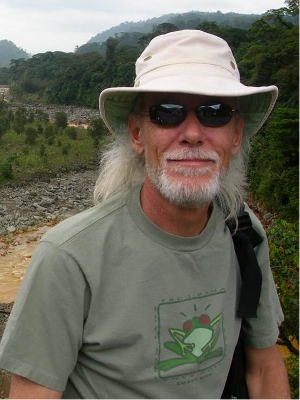
Professor of Biology
Associate Director of Natural Resources and Wildlife Technology Program
301-387-3332
peter.skylstad@garrettcollege.edu
Peter Skylstad
Professor of Biology
Associate Director of Natural Resources and Wildlife Technology Program
Academic area: Biology, NRWT
Bio:
Professor Skylstad is a Professor of Biology and also the Associate Director of the NRWT program at Garrett College. A graduate of Texas Tech University, Professor Skylstad earned degrees in Biology and Physical Geography. He has written numerous successful grants, including a $600,000 Maryland Department of Natural Resources Kempton Mine Complex Acid Mine Drainage Grant. He has coauthored and published a book on Central American biodiversity, 15 scientific papers and technical reports, and is responsible for a number of presentations and workshops. His academic interests include: wetland monitoring and restoration ecology, GIS and GPS technology, acid mine drainage remediation, and neotropical natural history and ecology.
Academic Degrees
- M.S. in Biology with a minor in GIS, Texas Tech University, 1997
- B.S. in Physical Geography with a minor in Biology, Texas Tech University, 1992
Research Interests
- Wetland monitoring and restoration ecology
- GIS and GPS technology
- Acid mine drainage phytoremediation
- Neotropical natural history and ecology
Awards & Honors
- Recipient of the Western Maryland Resource Conservation and Development Award, 2006 for innovative research in monitoring and restoring wetlands degraded by acid mine drainage. (2006)
- Selected as seminar speaker on undergraduate education abroad in neotropical environments at Texas Tech University’s Junction Field School as part of the Howard Hughes Medical Institute’s Summer Life Sciences Program and the Visiting Scholars Seminar Program. (August, 2011)
- Selected as seminar speaker at Texas Tech University on acid mine drainage remediation and wetland monitoring and restoration as part of the Visiting Scholars Seminar Program. (August, 2011)
Publications
- Lee, Jeffrey A., Attebury, J. Kelly, and Skylstad, Peter L., 1996, Soil Erosion Control Methods on the Southern High Plains, 1930s‐1980s; Fifth International Conference on Desert Development, Lubbock, Texas.
- Lee, Jeffrey A., Attebury, J. Kelly, and Skylstad, Peter L., 1996, Soil Erosion Control Methods on the Southern High Plains, 1930s‐1980s; Association of American Geographers Annual Meeting, Charlotte, North Carolina.
- Lee, Jeffrey A., Attebury, J. Kelly, and Skylstad, Peter L., 1999, Soil Erosion Control Measures on the Southern High Plains, 1930s-1980s: Desert Development: The Endless Frontier, Proceedings of the Fifth International Conference on Desert Development, 11-16 August 1996, vol. 2, International Center for Arid and Semiarid Land Studies, Texas Tech University, Lubbock, Texas, p. 710-714.
- Skylstad, Peter L. and Oliverio, Anthony M., 2016, Annual Report for the Kempton Mine Complex Wetlands Monitoring and Restoration Project. Prepared for the Power Plant Research Program, Maryland Department of Natural Resources, Tawes State Office Building, B3, 580 Taylor Avenue, Annapolis, MD 21401
- Huettmann, Falk (Editor) and Skylstad, Peter L., 2015, Central American Biodiversity: Conservation, Ecology, and a Sustainable Future. Springer Publishing Company, 11 West 42nd Street, 15th Floor, New York, NY 10036.
Teaching
- NRW 105/106: Environmental Science
- CSC 180: Geographic Information Systems
- ENT 170: Geospatial Data Collection and Analysis
- BIO 110: Natural History
- BIO 104: Principles of Biology
- BIO 102: General Biology
- ENT 201: Chemistry and Quantitative Methods
- ES 121: Physical Geography
- ES 101: Physical Geology
- CHE 102: General Chemistry II
- BIO 109: Human Biology and the Environment
- BIO 250: Neotropical Natural History
Presentations
- Multiple presentations at Maryland’s Bureau of Mines Kempton Mine Complex Working Group annual meetings for the North Branch of the Potomac Wetlands Project.
- Developed and presented GPS and GIS workshop for Maryland Agricultural Program High School teachers. (August, 2002)
- Developed and presented GPS and GIS workshop for Garrett County high school science teachers. (November, 2002)
- Developed and presented GPS and GIS workshop for Garrett County Board of Education. (October, 2003)
- Developed and presented multiple Gear-Up grant seminars and workshops for Garrett County middle and high school students.
Education Abroad Courses and Projects
- BIO 250: Neotropical Natural History Course - BIO 250 is a field course for advanced students in the basic principles and methodologies of natural history studies in a lowland tropical rainforest. Topics include climates and ecosystems, rainforest structure and diversity, evolutionary patterns, coevolutionary complexities and the ecology of fruit, the neotropical pharmacy, land use in the neotropics, savannas and dry forests, mangroves and coral reefs, and deforestation and conservation of biodiversity. Field and lab activities focus on amphibians, reptiles, birds, and mammals. Students study the taxonomy and ecology of each of these faunal groups and develop skills in locating, observing, handling, and field identification of common neotropical species.
- China Undergraduate Education Abroad Grant (May, 2012) – a $6,000 grant funded by the Ann Vernon Applegate Foundation to develop opportunities for undergraduate research and education abroad in China. The grant funded exploratory travel to two regions in China. The first leg of the trip covered 1500 kilometers of the lower Yangtze River from Chongqing to Shanghai with stops in the Three Gorges area, the Three Gorges Dam, and Huangshan (Yellow Mountain region), a UNESCO World Heritage site. The second leg of the trip was to Guangxi Autonomous Province near Guilin on the Lijiang (Li River). This area is famous for tower karst topography, numerous caves, unique flora and fauna, the Longsheng, Longji, and Dragon’s Backbone rice terraces, and is home to numerous ethnic minorities like the Zhuang and Red Yao people.
- Peruvian Amazon Natural History Expedition - A three week expedition to study the flora, fauna, ecology and natural history of the upper reaches of the Amazon River watershed system. The purpose of this trip was to develop a neotropical natural history course for undergraduates.






